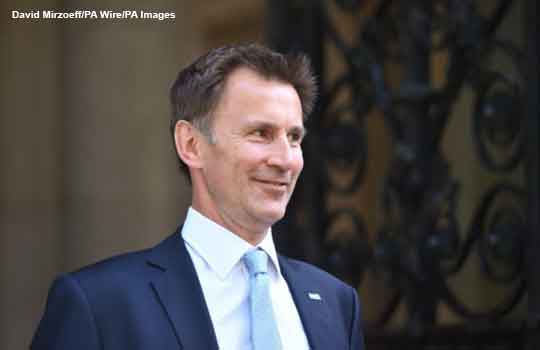 Jeremy Hunt, newly re-installed as health secretary, is set to speak at the NHS Confederation Annual Conference this week in a speech that could set the tone on health for this parliament and potentially the future of the NHS.
Jeremy Hunt, newly re-installed as health secretary, is set to speak at the NHS Confederation Annual Conference this week in a speech that could set the tone on health for this parliament and potentially the future of the NHS.
The election result may have brought a considerable amount of uncertainty, but there can be no accusations of a lack of clarity from the health and social care sector: help is required.
The Secretary of State has an opportunity to send a signal that the government has heard the concerns and is ready to act. I believe that there are three commitments that he could make which would meet this challenge.
The first is to commit to secure the contribution of non-UK health and social care staff as a priority in the negotiations to depart the EU.
This week we have already seen worrying statistics showing a rapid decline in the number of EU nurses applying for registration in the UK. The shortage of trained medical staff across the UK, including in my specialty of anaesthesia, threatens the sustainability of the NHS and current projections show it is likely to get worse. Securing the vital contribution of the NHS’s international workforce is the first step to getting us back on track.
Clinicians from every specialty are committed to maintaining an NHS that delivers world class care for every patient and are juggling the dual-pressure of higher demand and fewer resources. But if frontline staff don’t feel they have a voice on issues that affect them, it is difficult to see how the STP regime in England and the wider transformation agenda can bring about positive change.
The post-election analysis has focussed on the importance of canvassing a wide range of views to inform decision-making. With large-scale change already underway in the NHS, the second commitment that Hunt can make is for a greater depth of consultation with a wider group of clinicians, so that he can better understand the clinical implications of transforming the NHS.
The third commitment that Hunt should make is to guarantee sustainable long-term funding for the NHS.
The independent Institute of Fiscal Studies has said that the funding commitments in all the main party’s manifestos would not be enough to keep up with demand. While clinicians acknowledge and are committed to the need to be efficient with taxpayer funds—you get what you pay for. The idea of doing more with less is, quite frankly, increasingly an illusion. The expectation that this should continue is extremely demoralising for all health and social care workers.
No part of the system works in isolation and the delivery of patient care relies on multi-disciplinary cooperation by the primary, secondary, and social care systems. Anaesthetists interact with two-thirds of all hospital patients, but our work is affected by changes beyond the hospital walls. Inadequate primary care provision, limited public health services, or poor availability of social care can impact on the quality and timeliness of care provided in hospitals. This symbiosis is also seen as reducing staffing numbers in hospitals not only decreases morale, but also increases the risk of mistakes by overworked staff.
On Thursday, Jeremy Hunt has an opportunity to communicate a vision for health and social care that doesn’t put financial considerations before a commitment to quality, but ensures that patient-centred care is the focus of everything we do.
Liam Brennan is the President of the Royal College of Anaesthetists and Vice-Chair of the Academy of Medical Royal Colleges. He is also a consultant anaesthetist, Cambridge University Hospitals NHS Foundation Trust.
Competing interests: None declared.
